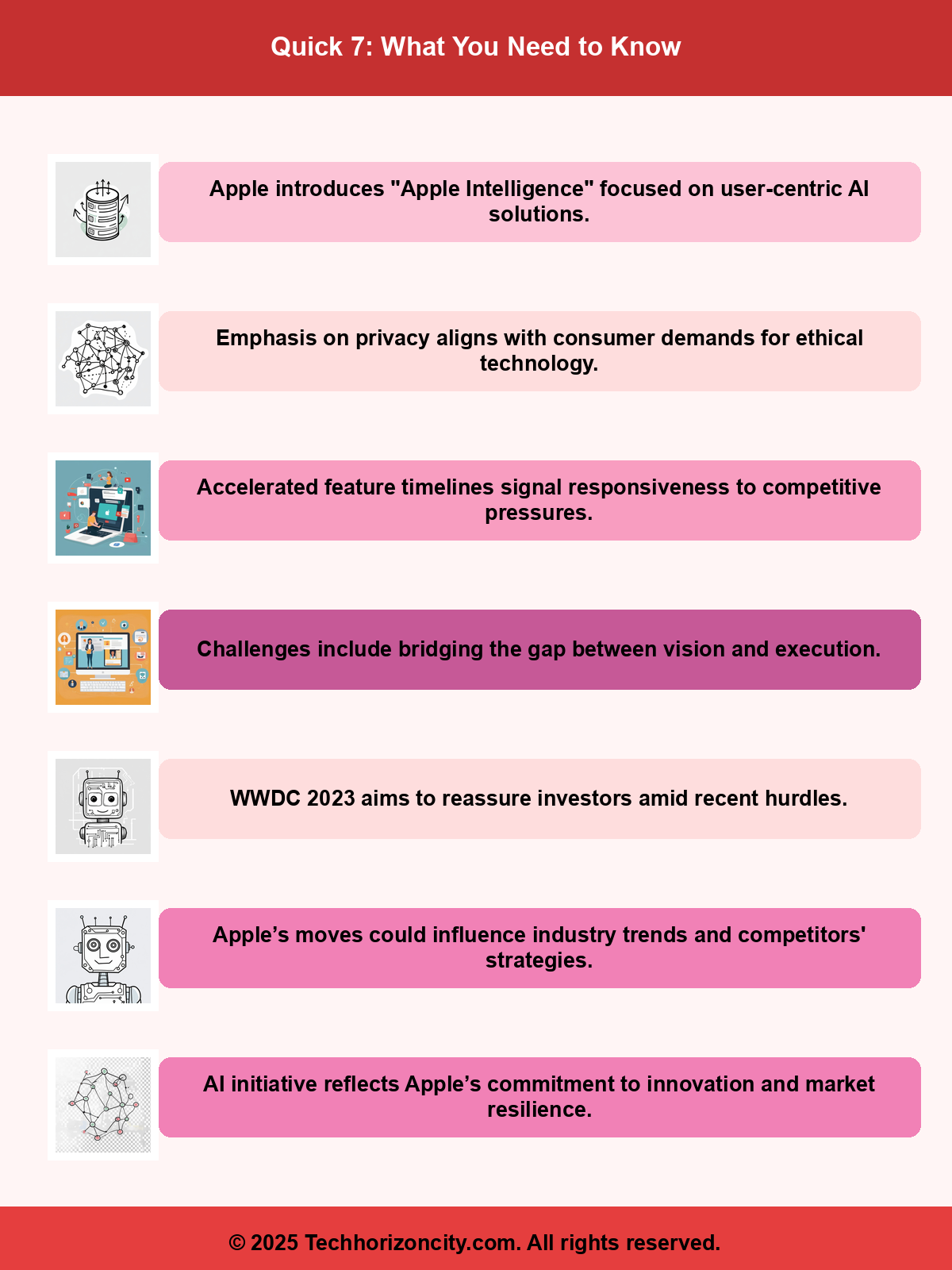Executive Summary
As Apple gears up for its much-anticipated Worldwide Developers Conference (WWDC), the tech giant stands at a crossroads. After navigating a tumultuous year marked by trade tensions and legal challenges, Apple is seeking to regain investor confidence while unveiling its vision for “Apple Intelligence,” a user-centric AI initiative. This blog post delves into the implications of Apple’s strategic decisions, the evolving landscape of artificial intelligence, and the potential impact on the company and the broader tech industry.

Background Context
The tech industry has always been a volatile arena, but Apple’s recent experiences have underscored the complexities it faces. From contentious tariff disputes during the Trump administration to a federal judge’s scathing remarks in an antitrust case, Apple has encountered significant hurdles. These challenges have contributed to a growing perception that the company has been slow to embrace the transformative power of artificial intelligence.
As Apple prepares for WWDC, the stakes are high. The conference is not just a platform to showcase new features; it’s an opportunity for the company to reassure investors about its strategic direction after a challenging year. In March, Apple hinted at accelerating its roadmap, announcing that features originally scheduled for 2024 would now be available in the near future, signaling an urgency to innovate and respond to market demands.
Analysis of Implications
Apple’s announcement of “Apple Intelligence” signifies an important shift in its approach to artificial intelligence. By focusing on personalized AI that prioritizes user privacy, Apple is positioning itself as a leader in ethical tech solutions. This could resonate well with consumers increasingly concerned about data privacy and security. However, the failure to launch AI features, including writing tools and integration with popular platforms like ChatGPT, raises questions about execution and readiness. It suggests a gap between vision and implementation that Apple must bridge to regain its innovative edge.
The shift in feature timelines indicates a responsiveness to competitive pressures and market dynamics. As companies like Google and Microsoft continue to make aggressive strides in AI, Apple’s accelerated timeline could signal a newfound agility. Yet, it remains to be seen whether these features will meet consumer expectations and whether Apple can effectively integrate AI into its ecosystem without sacrificing its core principles.
Industry Impact Assessment
The ramifications of Apple’s strategic decisions extend beyond its balance sheet. As one of the most influential players in the tech sector, Apple’s moves set trends that others often follow. By emphasizing user privacy in its AI offerings, Apple could push competitors to reevaluate their approaches, potentially leading to a broader industry shift toward more ethical AI practices.
Moreover, the introduction of a new naming convention for operating systems, a desktop Phone app, and resizable windows for iPads reflects Apple’s effort to enhance user experience across devices. This harmonization can lead to greater customer satisfaction, but the success of these updates will depend on their execution and usability. If done well, they could further solidify Apple’s ecosystem, making it more difficult for users to shift to alternative platforms.
Future Outlook
Looking ahead, Apple’s trajectory will likely hinge on how well it can capitalize on the impending AI revolution. If “Apple Intelligence” is executed thoughtfully, it could become a cornerstone of the user experience, driving customer loyalty and setting a benchmark for privacy-conscious AI solutions.
However, the tech landscape is rapidly evolving, and Apple must remain vigilant. As competitors innovate and consumer expectations shift, there could be pressure for Apple to not only introduce AI features but also to ensure they are continuously refined and expanded. The ability to adapt quickly to feedback and market trends will be crucial in maintaining its competitive edge.
Conclusion with Key Takeaways
As Apple approaches WWDC 2023, the company stands on the precipice of significant change. With a renewed focus on AI and a desire to alleviate investor concerns, it has the opportunity to redefine its narrative and strengthen its position in the tech industry. The implications of its decisions will resonate throughout the sector, potentially influencing how technology firms approach AI and user privacy.
In summary, key takeaways include:
- Apple’s commitment to user privacy in AI could differentiate it in a crowded market.
- The success of upcoming features will depend on effective implementation and user engagement.
- Industry-wide shifts towards ethical AI practices may be driven by Apple’s initiatives.
- Future agility and responsiveness to market demands will be critical for Apple’s sustained success.
In a world where technological advancements are rapid and relentless, Apple’s ability to adapt and innovate will be the key to its future prosperity. The upcoming WWDC will serve not only as a showcase of new innovations but also as a litmus test for Apple’s resilience and vision in a changing landscape.
Disclaimer: This article was independently created based on publicly available information and industry analysis. While inspired by developments reported at www.platformer.news, all content, analysis, and opinions expressed are original and do not reproduce copyrighted material.
For the original reporting, please visit: https://www.platformer.news/apple-wwdc-2025-ai/
